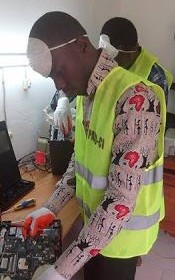WorldLoop and PARO-CI, an excellent relationship

Creating awareness on the risks of bad e-waste recycling within the informal sector and aiding them to find solutions and connect to the formal e-waste recycling actors is an important part of improving the work situation for thousands of informal e-waste recyclers, helping them to tackle the negative impact on the environment. This is especially important in countries like Ivory Coast, where the majority of e-waste is being collected and treated by the informal sector. Sharing information and creating a connection between the informal and formal recycling sector is a first important step to improving the current situation.
Since March 2015, WorldLoop is an expert partner of the consortium that form the The E-Waste Implementation Toolkit (EWIT) project, which aims to assist African municipalities to define solutions for effective e-waste management systems in their communities. For that purpose, different dissemination conferences have been organized in several African and European countries. On November 24th, one of the dissemination conferences took place in Abidjan, Ivory Coast. Taking advantage of that opportunity, the local NGO “Le Programme Assainissement- Recyclage Ordures de Côte d’Ivoire” (PARO-CI) organized a training workshop the following day for the informal e-waste sector in Abidjan. Informal workers were trained on the importance of responsible e-waste dismantling and the risks to human health of improper recycling technologies. PARCO-CI is an Abidjan base NGO that implements activities to create awareness related to the environmental threats of e-waste and promote environmentally friendly waste recycling initiatives, involving the informal sector. WorldLoop supported PARO-CI by providing them with some valuable training and sensitization materials, including some you-tube video’s that were created by the qamp.net project in Accra, Ghana.
Please click here to view the videos created together with the informal sector in Accra on some of the dangers of most important toxics linked to e-waste recycling.
